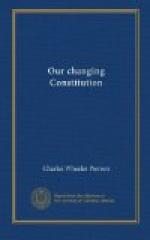In a conflict between economic forces and legal enactment there can finally be but one outcome. The law must sooner or later adapt itself to life conditions. The real problem to-day is—how shall this adaptation be accomplished; how can statutes be framed which shall check abuses without falling under the wheels of social progress? Right here a swarm of half-informed theorizers are rushing in where trained economists fear to tread. It is difficult and dangerous ground, but there is at least one measure of legal reform—take away the right of one corporation to hold stock in another—which might be urged with confidence were it not for the existence of sundry oppressive and conflicting state laws.
The abolition by law of the holding-company device is no new suggestion. It was strongly urged years ago by the late Edward B. Whitney. It was the keystone of the famous “Seven Sisters” statutes,[1] enacted with loud acclaim in New Jersey at the behest of Governor Woodrow Wilson (but subsequently repealed and thrown into the discard). Such a measure would be more effective and far-reaching than the public supposes. Nearly all the so-called trusts have been organized and are being held together in whole or in part, by the holding-company device. In many cases this has been done merely as an innocent measure of convenience. The device, however, is a perversion of the corporate machine to uses not contemplated by its inventors and fraught with danger. It is too powerful a weapon in the hands of those alive to its possibilities, enabling a small group of men with a relatively insignificant investment of capital to control a country-wide industry. Take the simplest possible illustration: The industry of manufacturing a particular commodity is carried on by a number of corporations scattered throughout the country with an aggregate capitalization of, say, $10,000,000. A, B, and C form a holding company




